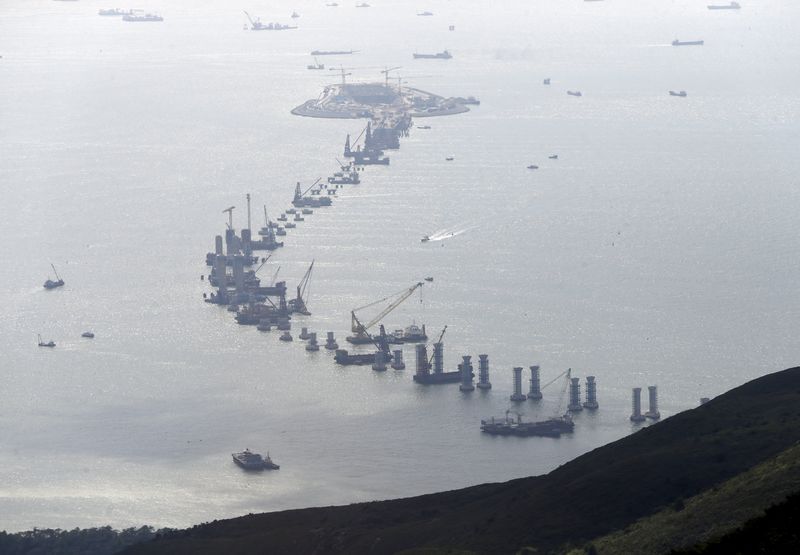By Clare Jim and Lawrence White
DONGGUAN, China/HONG KONG (Reuters) - Every day hundreds of garment traders alight at the newly-built Humen station to ply their wares in the southern Chinese city of Dongguan, arriving on high speed trains that whoosh through the terminal every ten minutes.
The station, 90 kilometers north of Hong Kong, is on the first open section of a super fast rail network in China's Pearl River Delta that HSBC (L:HSBA) is betting will turn the prosperous region of 40,000 square kilometers into a seamless metropolis that can fuel the bank's growth in the next decade.
A visit to the area though shows up how infrastructure construction that HSBC is hoping will drive the region's development is moving at a patchy pace, underlining risks the lender faces in its Asia "pivot" strategy.
Roads leading to the huge, gleaming building of Humen station are permanently congested and not properly built, local residents say.
"The government's been constructing the road for over two years but it's still muddy and full of bumps and holes," a factory owner in the nearby town of Daojiao said.
A local taxi driver named Xu complained there are only 200 parking spaces outside the rail station, making access difficult.
"The government had expected the high speed railway to bring more people, but they didn't use their brain to plan carefully," he said.
Other, more fundamental, pieces of construction for the region are behind schedule.
Hong Kong's transport minister said in January that a network of bridges and tunnels to link Hong Kong, Macau and the city of Zhuhai across the Pearl River Delta will not be finished by its 2016 target date amid rising costs.
Protests by Hong Kong citizens worried about competition for jobs have also caused delays to Beijing's plans to better integrate the territory into the region.
HSBC investors largely support the bank's plans to beef up its presence in the Pearl River Delta, which include quadrupling its headcount, and increased lending to mid-sized companies in the infrastructure and real estate sectors
But they caution the move faces potential pitfalls.
"They will have to be very careful to make sure they don't waste a lot of money or make bad loans," said Hugh Young, managing director of Aberdeen Asset Management Asia, HSBC's 6th largest shareholder.
HSBC declined to comment for this story. Last week executives said the bank's long experience in China and prudent approach to lending will mitigate the risks.
"The GDP per capita in the Pearl River Delta is similar to Hong Kong in 1991, we know how to capitalize on this opportunity because we've done it before," HSBC's Asia Pacific chief executive Peter Wong told investors.
MEGACITY, INTERRUPTED
Rapid urbanization over the past 15 years has caused the Pearl River Delta to overtake Tokyo as the world's most populous urban area. Its population rose from 27 million in 2000 to more than 42 million in 2010, according to World Bank data.
The region has an annual gross domestic product of $857 billion, which would rank it 17th in the world if it were a country, just below Indonesia, according to the IMF.
Around half of HSBC's China revenue already comes from the area, and it has more branches there than any non-Chinese rival.
But after booming in the 1990s and 2000s as one of China's main export and manufacturing hubs, companies in the Pearl River Delta have struggled in recent years due to falling export demand and tighter credit conditions.
Industrial and Commercial Bank of China (SS:601398) said in its 2014 annual report that the Pearl River Delta saw the highest level of bad loans of any region in China, with 1.64 percent of loans soured against 1.18 percent the previous year.
That makes some analysts question why HSBC is choosing to expand now.
"HSBC has materially increased exposure to mainland China in recent years and this is a building risk factor, given our concerns on its credit bubble and likelihood of credit deterioration in the coming years," CLSA analysts wrote in a June 5 report.
China is hoping road and rail links to integrate the Pearl River Delta's cities, and suck Hong Kong into its folds, will put it back on a faster growth path.
HSBC is not alone thinking this is a policy it can reap potential riches from.
Singapore's Oversea-Chinese Banking Corporation (SI:OCBC) has expanded in the region through investing in Hong Kong's Wing Hang bank and, like HSBC, is hoping to work with local companies looking to do more business offshore.
The pair have to contend though with restrictions on how foreign banks can operate, which cede competitive advantages to local players.
During an early afternoon visit to an HSBC branch in Nancheng District in Dongguan last Thursday, Reuters saw no customers while local rivals across the street were busy.

"HSBC has very few branches...After dealing with it once I don't want to go back anymore," said a man called Huang outside a nearby ICBC branch, who works in personal finance.